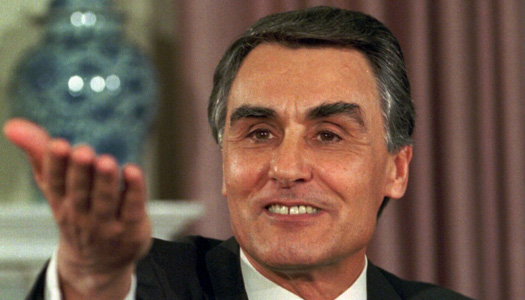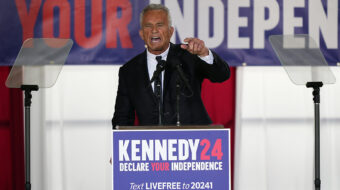
On Thursday, Oct. 23, the President of Portugal, Anibal Cavaco Silva, re-appointed Pedro Passos Coelho as Prime Minister, rejecting an offer by the majority in parliament to form a center-left government.
Cavaco Silva and Passos Coelho both belong to the Social Democratic Party, which, in spite of its name, is a right wing party in Portugal. Passos Coelho’s coalition, which pairs the Social Democratic Party (PSD) with the also conservative CDS-People’s Party (CDS-PP), came to power after the 2011 elections in which voters punished the incumbent Socialist Party for having signed onto harsh austerity measures demanded by the “Troika” of the European Central Bank, the International Monetary Fund and the European Commission (the executive of the European Union).
Unsurprisingly, the right wing coalition government went ahead and imposed harsher austerity on the Portuguese people, with a typical program of privatization, budget cuts, cuts in wages and pensions and attacks on labor rights. Portugal currently has a 12 percent unemployment rate and a 20 percent poverty rate, with a much worse situation for young workers, many of whom have been forced to emigrate. Yet it still carries heavy debt.
In the Oct. 4 elections, the governing coalition got 38.6 percent of the popular vote and 107 seats in the 230 seat parliament, a considerable loss since 2011 and not a majority but still a plurality. The Socialists gained ground, getting 32.3 percent of the popular vote and 86 seats in parliament.
Parties to the left of the Socialists made significant advances: The Portuguese Communist Party and its Ecological Green Party allies got 8.3 percent of the popular vote and 17 seats in parliament (one more than previously), and the Left Bloc swept forward with a popular vote of 10.2 percent and 19 seats in parliament, nearly doubling their previous representation. So among them the Socialists, Communists-Greens and Left Bloc have 122 seats, as opposed to Passos Coelho’s 107.
In Portugal, the president is supposed to work with the representatives of the parties in the legislature to put together a workable government. In theory he should be a facilitator and not a partisan. But Cavaco Silva signaled, early on, that he wanted to see the current austerity policies continued.
He first tried to get Prime Minister Passos Coelho to form a governing coalition with the Socialist Party, but Socialist Party Secretary General Antonio Costa complained that the prime minister wanted to do this on a “take it or leave it” basis without making any concessions on austerity. So Costa turned to the Communist-Green alliance and Left Bloc, and worked out an agreement with both whereby they would guarantee support for a Socialist Party government, only on condition that the Passos Coelho government be ousted, and that stronger efforts be made to turn back austerity.
Both the Communists and the Left Bloc are in favor of Portugal leaving NATO and the Euro currency zone, but did not make this a condition of their support for Costa and the Socialists.
Costa then presented Cavaco Silva with this agreement, whereby he would form a new government with Communist-Green and Left Bloc support. Today, Cavaco Silva angrily rejected the offer and re-appointed Passos-Coelho’s coalition as a minority government.
The President called for parliamentarians from the Socialist Party to dissent from their party’s instructions and support this government. Almost immediately, Costa announced that he would present a motion in parliament to bring this government down. He will certainly have Communist-Green and Left Bloc support for such a motion. He must make sure, however, that his own parliamentary caucus holds firm.
Cavaco Silva said that the plan for a government of the Socialist party, supported by the Communists, Greens, and Left Bloc, was undemocratic because the PSD-PP coalition had got a plurality in the elections, even though the socialists and their allies actually had a majority in parliament and a small majority in the popular vote.
A big objection was that the Communists and Left Block want Portugal to get out of NATO and out of the Euro currency zone. This is true, but they had explicitly told Costa that this would not be a condition for their supporting his government, so it is a pretext. Cavaco Silva saw withdrawal from NATO as a betrayal of Portugal’s honor. The Portuguese government brought the country into NATO under the nasty “New State” regime of dictator Antonio D’Oliveira Salazar.
Cavaco Silva’s reason for defying the parliamentary majority and reappointing the Passos Coelho government reflected his own right wing and anti-communist political views, but also pressure from European Institutions. In the weeks after the election, the Troika had demanded that the Portuguese government present a budget for its review right away, to make sure austerity measures were strong enough. Portugal is not in as bad shape as Greece, but the Troika still has some power to do this. Portugal also signed onto the European Stability Pact, which requires that members of the European Union adhere to very strict limits on running budgetary deficits. Jeronimo de Sousa, the Secretary General of the Portuguese Communist Party, has called this drastic instrument the “pact of death” because it forces harsh austerity measures on poor countries like Portugal.
It and the other austerity mechanisms have been the focus of recent mass labor and people’s protests in Portugal and other European countries. The rhetoric that Cavaco Silva used emphasized the need for Portugal to keep its commitments to “Europe”, lest it face fiscal and economic disaster. So both the president and the prime minister are on a collision course with a considerable sector of the public.
In Portugal there is a presidential election in January 2016, in which Cavaco Silva’s actions will surely be an issue.
Photo: Despite the fact that the majority of Portugal’s voters supported either Left or Centrist candidates, the country’s president, Anibal Cavaco Silva, reappointed the existing right-wing government, which opponents now vow to bring down. | AP












Comments